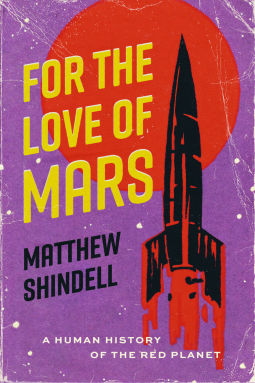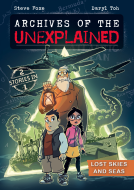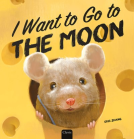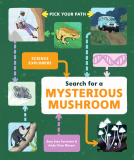
For the Love of Mars
A Human History of the Red Planet
by Matthew Shindell
This title was previously available on NetGalley and is now archived.
Send NetGalley books directly to your Kindle or Kindle app
1
To read on a Kindle or Kindle app, please add kindle@netgalley.com as an approved email address to receive files in your Amazon account. Click here for step-by-step instructions.
2
Also find your Kindle email address within your Amazon account, and enter it here.
Pub Date May 18 2023 | Archive Date Apr 23 2023
Talking about this book? Use #FortheLoveofMars #NetGalley. More hashtag tips!
Description
Mars and its secrets have fascinated and mystified humans since ancient times. For the Love of Mars surveys the red planet’s place in the human imagination, beginning with ancient astrologers and skywatchers and ending in our present moment of exploration and virtual engagement.
National Air and Space Museum curator Matthew Shindell describes how historical figures across eras and around the world have made sense of this mysterious planet. We meet Mayan astrologer priests who incorporated Mars into seasonal calendars and religious ceremonies, Babylonian astrologers who discerned bad omens, figures of the Scientific Revolution who struggled to comprehend Mars as a world, Victorian astronomers who sought signs of intelligent life, and twentieth- and twenty-first-century scientists who have established a technological presence on the planet’s surface. Along the way, we encounter writers and artists from each of these periods who took readers and viewers along on imagined journeys to Mars.
By focusing on the diverse human stories behind the telescopes and behind the robots we know and love, Shindell shows how Mars exploration has evolved in ways that have also expanded knowledge about other facets of the universe. Captained by an engaging and erudite expert, For the Love of Mars is a captivating voyage through time and space for anyone curious about Curiosity and the red planet.
Advance Praise
“This is the right voice to bring Mars vividly to life. Shindell’s history of what we know about the red planet goes beyond Western ideas, bringing valuable knowledge from many times, places, and cultures both into our view and into rich conversation. Its diverse perspectives and cast of characters make For the Love of Mars an essential read.” ― Janet Vertesi, author of Shaping Science: Organizations, Decisions, and Culture on NASA’s Teams
“Through a wonderful combination of scholarly scientific research and thoughtful humanist perspective, Shindell’s For the Love of Mars provides a delightfully educational and entertaining history of our exploration of the red planet.” ― Jim Bell, Mars researcher and coauthor of Discovering Mars: A History of Observation and Exploration of the Red Planet
“Shindell has done the impossible: setting out the long history of human engagement with the red planet over thousands of years in a single book. For the Love of Mars is compelling reading for anyone who has ever looked at, or even just wondered about, the fourth world from the sun and whether we'll set foot on it someday.” ― Robert Massey, deputy executive director of the Royal Astronomical Society
Available Editions
| EDITION | Other Format |
| ISBN | 9780226821894 |
| PRICE | $27.50 (USD) |
| PAGES | 248 |
Links
Available on NetGalley
Average rating from 20 members
Featured Reviews
 Maria Grazia B, Book Trade Professional
Maria Grazia B, Book Trade Professional
Mars, the red planet, occupies a space of its own in the collective imagination. Its peculiarities, most notably the red colour it takes on at certain times, have given it a prominent place among celestial bodies. Countless works of fiction have been dedicated to it, among which I would like to mention 'Stranger in a Strange Land', in which the protagonist, a human raised by Martians, takes on an almost Christ-like stature. Shindell's book is not fiction, but an essay that takes the reader through all the stages of the birth and growth of the myth of Mars, right up to the most recent explorations and the confirmation that curiosity about the planet probably has something to do with the affinity we humans feel for that 'lost twin' of Earth.
 Reviewer 1091266
Reviewer 1091266
This is a 4.5 star read for me. I always round half stars down.
This book is an interesting and, in my opinion, refreshing examination of humanity’s fascination with Mars. I was glad that this book placed Mars in a broader cultural context instead of only focusing on science. This balance was sometimes lopsided — the opening chapter was a little heavy on discussions of creation myths and while I don’t think any of that information doesn’t belong in a study of Mars, I would have liked to see more mention of the role Mars, specifically, played in the ancient cultures featured in this book. The book as a whole was weighted a little heavily toward the Cold War-Present day era of Mars, which is understandable given the wealth of information recent Mars missions have generated. I still would have liked to see this balanced out with a more thorough examination of historical accounts of Mars.
As a science fiction fan, I appreciated the discussions of Mars in literature and how Martian exploration was used as a framework for stories of imperialism. These discussions showed more than any other part of the book the role Mars played in the imaginations of peoples past and present. This book sought to be anti-imperialist in its discussion of Mars, challenging the Euro-centric notion that medieval European astronomers had the most sophisticated knowledge and continued to challenge modern colonialist ideas that are so often invoked in the discussion of sending humans to Mars. I do think this book would benefit from a companion book or expanded edition that places even heavier emphasis on non-western cultures and gives a platform for marginalized people who have been left out of the conversation on space exploration to further elaborate on the question, “Who do we want to be when we become Martians?”
Overall, this is a thought-provoking, entertaining read that has enough science to satiate nerds like me, but not so much technical detail that non-scientists would be scared off. I’d recommend it to readers of space exploration stories both fictional and fantastical.
This was a very interesting book. I love the way the author talked about humans and Mars. I would say pick it up if your a science nerd. You will love it. I hope to own this one day.
Countless works of fiction have been dedicated to it, but an essay that takes the reader through all the stages of birth and growth of the myth of Mars. I think the opening chapter was so what heavy. I would have like to read more about the role of Mars.
Overall this is a thought provoking, entertaining read that has enough science to satisfy needs like me, but not so much technical detail that a non-scientists would be scared off of it. I would definitely recommend the book too readers of space exploration stories both fiction and fantastical.
 Reviewer 901611
Reviewer 901611
This book is excellent! It has a really awesome combination of science and history, balancing the two in a way that feels accessible for readers coming with multiple frames of reference. It was really neat to have in one volume discussions of ancient cultures and myths and modern day science and Cold War history and sci-fi literature. Just overall a really cool and entertaining read.
 Kara R, Reviewer
Kara R, Reviewer
Science, politics and fiction all reflect and effect each other in the history of human's fascination with Mars. The stories drive people to study mars and the politics heavily influence both what kind of stories are told and what kind of science is allowed to happen.
From the oldest creation myths to the shows on TV today, Shindell examines both what we know about Mars and the stories we tell about the Red Planet in this fascinating book both about Mars and our own history.
 Media/Journalist 1075643
Media/Journalist 1075643
Seriously cool book about a topic that is dear to my heart—space exploration! The first book I've ever seen that asks why we think we have the right to colonize Mars.
This is a fun and immersive book about human fascination with Mars. Shindell’s aim is to draw an arc through history, from ancient times until now, on Mars in our imagination and meaning—from an erratic, eccentric light in the sky, to the relatively known quantity it is now, a rocky, cold planet. He takes readers on a tour from Mayan and Babylonian astrologers, among others, through astronomy in the Middle Ages with Galileo; seventeenth and eighteenth scientist-philosophers like Descartes, Newton, and the Herschels; Pickering, Lowell, and others; writers like Wells, Lasswitz, Wicks, Burroughs, Clarke, Bradbury and Sagan; through to the space race of the 1960s, and the impact of the Cold War on today’s missions.
Space exploration has become much more international in recent times, and Shindell is careful to be as inclusive as possible, where another author might focus all of their attention on the seeming leader in popular imagination, the US. A quote near the beginning of the book explains why:
Of course the “we” of Mars exploration will be construed differently by different readers, and it is my hope that by the conclusion of this book it will be obvious that the “we” should be construed as broadly as possible.
Some questions Shindell helps me answer: Why should I, a Zimbabwean woman, care about Mars exploration? Who is the popular idea of Mars for? Who was it for before? What contributions to the human idea of Mars have come from non-European sources? How has what we imagine Mars to be like changed over time? What books and films have contributed to our imagination about Mars? What is the future of Mars for us: exploration, or habitation? Really, the only question Shindell has not dealt with—perhaps has not been able to—is why the dream of Mars is full of men.
Important to Shindell is Mars in the imaginary, and he makes important points about the language of space missions—frontier, and colonizing new worlds—where he proves eloquent in locating that in recent Earth history. He also talks about the Mars/NASA PR machine, and why Mars continues to loom large for us: an example is how many of us—those who are terminally online—witnessed the death/fading away into the dark on Twitter of Opportunity Rover, which is referred to by Shindell in an excellent chapter about NASA’s exploration missions after Apollo.
This is probably the only non-fiction book on Mars you ever need to read. Certainly, it is one of the best. Although very detailed—which got me a little bogged down when the author dealt with the age of philosophers, Plato, Aristotle, and Ptolemy— it is comprehensive, factual and intellectual, while remaining very accessible. It is an essential and important corrective—more correctly, the beginning of one—for the Eurocentric discourse on Mars. For the Love of Mars is an excellent read, and I highly recommend it.
Thank you to University of Chicago Press and NetGalley for access.
 Media/Journalist 217456
Media/Journalist 217456
‘For the Love of Mars’ Review: Seeing Red
If we allow imperialism to inform our modern approach to Mars, there may be a return to the crueler legacies of that earlier age as well.
By Michael Saler
The Wall Street Journal
Dec. 27, 2023 at 5:47 pm ET
When it comes to Mars, humanity’s conceptions of the “angry red planet” have been surprisingly mercurial. It has been seen variously as a deity or an oracle; a world rife with life or hopelessly sterile; a setting for utopias, dystopias, even Ziggy Stardust. For many, though, such imaginative possibilities from the past are irrelevant. Mars’s rosy future is what beckons now: a new frontier awaiting human colonization, fulfilling our manifest destiny amid the stars.
Such catchphrases, however—“new frontier,” “colonization,” “manifest destiny”—are laden with associations from the age of imperialism, whose crueler legacies could return if the spirit of that earlier age informed our modern approaches to Mars. Wealthy nations and private entrepreneurs intend to establish habitats on the moon within a generation and are targeting Mars as the next giant leap for humankind. How they pursue such ambitions will be affected by many factors, including their own historical presuppositions.
In “For the Love of Mars,” Matthew Shindell, a historian of science and a curator at the Smithsonian’s National Air and Space Museum, explores how humanity’s shifting views about the red planet reflect changing historical contexts and how these ideas enable certain options while constraining others. His fascinating narrative details how today’s discussions have been conditioned by distant antecedents. The book is a compact yet expansive survey, delving judiciously into the histories of religion and science, mass culture and popular literature, the Cold War and the Space Race—highlighting past mistakes and commending new possibilities.
Mars assumed its singular role in human history within the past 200 years. During the ancient, classical and medieval periods, humanity defined itself in terms of its reciprocal relationship with the cosmos, which was believed to be alive and purposeful. Mars played its part among the heavenly bodies but was also something of a prima donna, commanding fascination mixed with fear. For many ancient cultures, the planet’s distinctive red color and pronounced retrograde motion—it occasionally appears to be moving erratically rather than in a straight line—connoted wrath and inconstancy. The Greeks identified it with Ares, the god of war, known to the Romans as Mars. Yet its martial position could be spun in more constructive ways. In his “Divine Comedy,” Dante linked Mars with the virtue of fortitude, peopling the planet with the spirits of Christian martyrs.
From the 15th through the 18th centuries, this animistic model of the cosmos was largely replaced in Europe by scientific, commercial and imperialist perspectives. Terrestrial and celestial realms alike now obeyed uniform, mechanistic laws. Using telescopes, astronomers began to map Mars, just as terrestrial explorers were mapping the globe. But whereas the geographic exploration of Earth was couched in terms of progress, thus obscuring the damage inflicted by colonial powers, Mars has not faced this unequal power dynamic—until now. Among the current plans for the planet Mr. Shindell sees threats that could create “new inequities by developing Mars opportunities for some at the expense of others.”
“The year 1877,” the author notes, “marked a turning point” in the human understanding of Mars. The Italian astronomer Giovanni Schiaparelli observed sharp-edged lines crisscrossing the planet, which he called canali (“channels” or “canals”). Schiaparelli was agnostic about whether the canali were of intelligent design, but Percival Lowell, an affluent amateur astronomer besotted by the exotic, became a zealous believer. In 1894 Lowell built an observatory in Flagstaff, Ariz., and soon issued popular accounts of his eye-opening “discoveries”: Mars was inhabited by an intelligent race, he evangelized, constructing canals to irrigate their parched planet. His fanciful notions were spread by the new mass media, creating a fad for Mars among the public and fury among professional astronomers, who by the early 20th century would disprove his theories.
Lowell’s Mars—and space in general—became the “new frontier” of human exploration, redressing turn-of-the-century fears that the human species would degenerate without fresh territories to conquer. The colonialist and hierarchical assumptions of earlier ages were rejuvenated by thrilling adventures set on Mars, such as Edgar Rice Burroughs’s “A Princess of Mars” (serialized 1912). But inconstant Mars could also be used to critique imperialism. In “The War of the Worlds” (serialized 1897), H.G. Wells enjoyed having his martians thoroughly trounce England.
These and other works of science fiction inspired many individuals who went on to develop rocketry and, later, the Cold War space program. The latter injected militarism and geopolitics into human considerations of space, as well as generating new scientific knowledge about the red planet. From the 1960s to the present, Mars’s surface has been completely mapped and is currently populated by robots seeking signs of organic life.
Mr. Shindell dismisses arguments that we need to establish human colonies on Mars to preserve the species from natural or man-made disasters on Earth, finding it “ridiculous to think that making an uninhabitable planet habitable would be easier than preserving life on our own.” If we are to support human missions, he insists that the efforts be aimed at more collective purposes than geopolitical and military power, legacies of the Cold War that reverberate today. By our focusing on sustainable technologies that could be used on Earth as well as Mars, and by not repeating “colonization histories that exploit and exclude,” Mr. Shindell believes that humanity can dramatically redirect its course. Might this be too utopian? All it would take is for the species to repossess the mercurial nature it projected onto Mars.
Readers who liked this book also liked:
Steve Foxe
Children's Fiction, Comics, Graphic Novels, Manga, Middle Grade
Amy Seto Forrester; Andy Chou Musser
Children's Fiction, Comics, Graphic Novels, Manga, Science
Sarah Becan
Comics, Graphic Novels, Manga, Cooking, Food & Wine, Nonfiction (Adult)


















